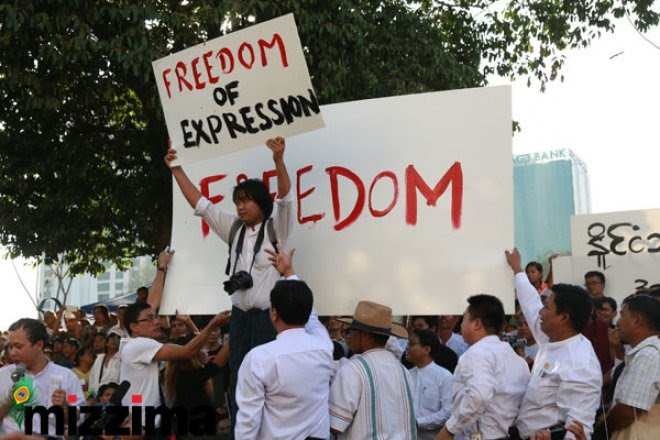In one of the biggest demonstrations in Myanmar in years, thousands of protesters gathered in central Yangon on January 5 to demand the repeal of laws blamed for violating human rights.

An estimated two thousand people from nearly 60 activist groups participated in the demonstration, one of the biggest in Yangon since the monks’ protests in 2007 that were crushed by the then military junta.
The protest, attended by members of the 88 Generation Peace and Open Society group, dozens of other civil society groups, and workers’ and farmers’ organizations, came a day after Myanmar marked the 66th anniversary of its independence from British colonial rule.
The symbolic venue chosen for the two-hour afternoon protest was Mahabandoola Park, which is dominated by the soaring Independence Monument.
Police had granted permission for the demonstration, which targeted two laws that have been used to arrest and jail hundreds of political activists.
They are Section 18 of the Peaceful Assembly and Procession Law, which was enacted by parliament in December 2011 and requires prior police permission for gatherings and marches, and Section 505 (b) of the Penal Code, relating to offences deemed by the authorities to be against public tranquility.
Among speakers who condemned the two laws as repressive was a leader of the 88 Generation Peace and Open Society group, Ko Ko Gyi.
“The people think laws come from above and rulers force people to abide by them; but nowadays we must work for laws that come from the people,” Ko Ko Gyi said.
“The laws must guarantee the protection of human rights and the people and there must be no laws that ban and violate fundamental human rights,” he said.
Ko Ko Gyi said that after regaining its independence in 1948, Myanmar signed the Universal Declaration of Human Rights which gave every citizen the right to freedom of expression and freedom of association.
“We don’t need to seek permission from any authority to hold a peaceful demonstration,” he said.
Other speakers called for further protests to demand the right to freedom of expression and other fundamental rights. They said such protests were important during the transition period to ensure that fundamental rights were guaranteed and made secure.
As the demonstration was taking place, organizers distributed leaflets reminding protesters of the conditions under which the two-hour gathering was allowed, including the need to disperse by 5pm.
A bill to amend Section 18 was submitted to parliament in November during its last sitting of 2013 and has been accepted for debate.
More than 200 people have detained under Section 18 but most have benefitted from the pledge by President U Thein Sein last July that all political prisoners would be released by the end of 2013.


